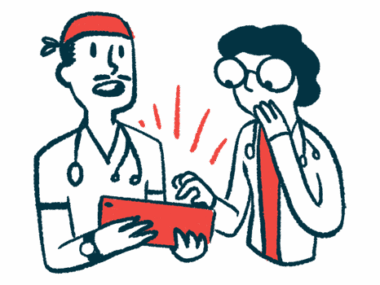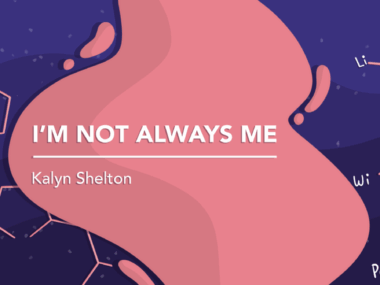Facing Discrimination With an Invisible Illness
Written by |

I was already emotional before I checked in at the nurse’s station. More than a week into a severe acute porphyria attack, I needed urgent hospital intervention.
My body was weak and my mind was disoriented. Luckily, the direct admission orders from my hematologist allowed me to bypass the emergency department, with its prolonged wait times and notorious land mines of rare disease misunderstandings.
Inside the doors of a small side entrance, the opposite end of the hospital was comparatively quiet. Unfortunately, cobwebs and shadows filled the space where a cluster of ambulatory wheelchairs typically sat, waiting patiently to support distressed patients like me. The last thing I wanted to do was prolong my pain by the minutes it would take to procure an additional wheelchair. Instead, I decided to ride the elevators up without asking for help. I took a deep breath, filling my nostrils with the gentle fragrance of sterilization chemicals, and boarded.
I pressed the button for the third floor, then collapsed against the wall, letting my overnight bag fall to the floor. I felt the subtle pull upward and turned my head toward the mirrored panels of the elevator, glimpsing my reflection. My eyelids were a little heavier than usual and my hair hadn’t been brushed that day, but otherwise I looked like my typical self.
Acute hepatic porphyria (AHP) is a rare and often invisible illness that can be chronic. Nausea, pain, and fatigue are easy to disguise. As a result, I may look able-bodied, even in the throes of an attack. Over the years, I’ve learned how the medical community values invisible illness. For instance, symptoms that can’t be quantified are worth less than those that can, and because pain can’t be measured objectively, it may not exist at all.
Minutes later on the inpatient floor, I leaned against the check-in counter, pleading with a nurse to let me into my room. I needed to lie down. I needed fluids and medication for the pain and nausea. Seemingly oblivious to my distress, she looked at me quizzically, then turned her attention back to her computer screen. What was taking so long?
After an incredibly confusing exchange in which she thought I was a visitor, here to check in on a hospitalized loved one, she barked out a laugh. “Well, you sure don’t look sick!” She shook her head, explaining her mistake. Then, to my horror, she continued giggling to herself as she made me a hospital bracelet.
Just like that, a place of solace and healing had transformed to one of prejudice and judgment. I was humiliated.
Through crippling pain and burning shame, I managed a smile. I was finally escorted to my room, but no longer wanted help getting there. Instead of feeling safe enough to surrender to the throes of my attack, I felt guarded. And worse, I felt trapped. Sitting rigidly upright in my hospital bed, I balanced on an emotional edge, between putting on a show and caving in.
***
Without a patient and compassionate medical provider, accessible care, and adequate, attainable health insurance coverage, diagnosis of an invisible illness will take a lifetime. Unfortunately, answers are urgent for life-threatening conditions like AHP, for which a prolonged diagnosis can cause permanent, disabling nerve damage.
Over my 19-year diagnosis journey, I was demeaned and dismissed by healthcare professionals, some of whom I’d known for years. They’d glance at my normal test results and determine I suffered from nothing more than toxic stress, a mental illness. Gently and empathetically, they’d ask me again and again if I’d tried yoga.
Obtaining a genetic diagnosis is a colossal feat in the lives of many with AHP. When I received mine, I clung to it for protection, holding the sequence in front of me like a trusty shield. I thought the test confirmation would change everything, and while an identified variant does help providers better understand my invisible symptoms, it doesn’t erase the stereotypes completely.
People living with ailments others can’t see face discrimination in doctors’ offices and navigate the well-meaning misunderstanding of loved ones. We bob and weave through ableist comments in public, choosing between the risky burden of educating others or grasping at our dignity by silently leaving the situation.
Along the roller coaster of rare disease diagnosis, we climb steep hills of implicit bias, and our worlds are turned upside down by trauma. We endure judgment and shame for invisible symptoms, without satisfactory medical explanation in return. When we do emerge on the other side, war-torn and exhausted, yet empowered with answers, we rarely receive an apology or compassion. Instead, we are pushed toward treatment protocol that heals our broken bodies, but neglects our injured souls.
We, the invisibly ill, should not have to meet stereotypes to be taken seriously.
***
Note: Porphyria News is strictly a news and information website about the disease. It does not provide medical advice, diagnosis, or treatment. This content is not intended to be a substitute for professional medical advice, diagnosis, or treatment. Always seek the advice of your physician or other qualified health provider with any questions you may have regarding a medical condition. Never disregard professional medical advice or delay in seeking it because of something you have read on this website. The opinions expressed in this column are not those of Porphyria News or its parent company, Bionews, and are intended to spark discussion about issues pertaining to porphyria.






Debra Nichols
Since being diagnosed 2 years ago with prophetic cutanea tarda I have been in severe pain, doctors keep saying I have arthritis in all my joints. Nothing they give me stops the pain! Any suggestions